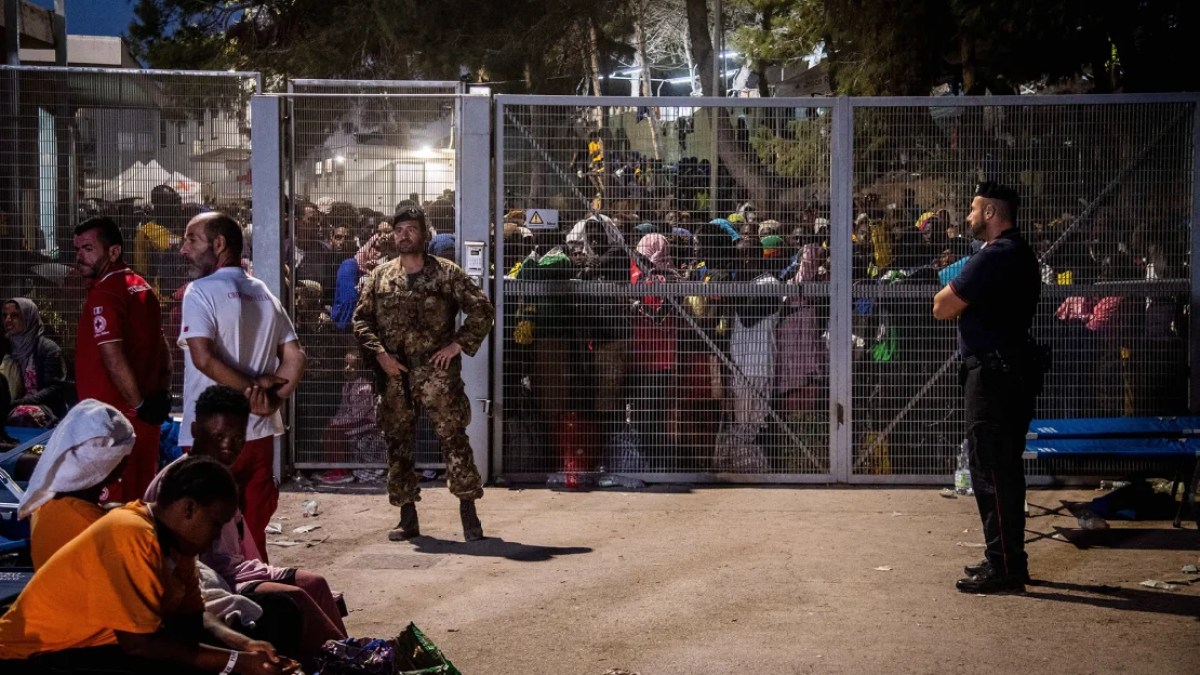The "hot spot" in Lampedusa...the headline of the European migration crisis
In the Coentrada Impriacola area, about 6 kilometers from the center of the island of Lampedusa, there is the most famous reception center for irregular migrants in Europe, known as the “Hot Spot.”
The situation seems calm inside the center, unlike what happened months ago during the “hot summer of migration.” There is not a large presence of migrants compared to the past few months, while the number of Italian Red Cross members, police, and soldiers is large.
On the sides of the road to the center, you will also notice a heavy presence of various types of Italian security personnel, despite the small number of migrant boats arriving and the state of calm on the island.
Overall, Lampedusa and the hotspot appear to be in an almost militarized state, with entry only permitted with time-consuming additional permits.
Lampedusa is not remembered without this “hot spot,” as geography determined this island to be a major gateway for irregular migrants to Europe, and its role increased after the decline of other paths between Greece and Turkey or Belarus and the Balkans, so it became a major station for those who were lucky enough to reach its shores. .
Between two banks
For decades, the island has become the most prominent address of the migration crisis in the Mediterranean, as it is the first port of entry for small boats that leave the coasts of North African countries, especially Tunisia and Libya, and then Egypt to a lesser extent, in the hope of reaching the shores of European Union countries.
With the same geography and a complex network of smugglers and brokers, Tunisia - whose coast is no more than 140 kilometers away from Lampedusa or less - has become a major destination and then a corridor for tens of thousands of irregular migrants from sub-Saharan Africa and even from Asia towards the Italian island, and it is necessary for those who survived From that journey to pass through the "hot spot".
There were no more than 40 migrants in the “hot spot” center, which extends 200 meters long and 50 meters wide or less, according to what an Italian Red Cross member told us, who was reluctant to give any other information. Some of them appear through the outer iron gate, and no one is allowed to enter or enter. Talking to the few immigrants at the center.
Two members of the Italian army guard the hotspot center in Lampedusa (Getty)
I do not know how I imagined to find among the few who appeared to me from afar in the hotspot the Gambian boy “Sam” (18 years old), whom I met with his companions about 3 months ago in Tunisia while he was walking on the road between the cities of Kasserine and Sbeitla, intending with his companion to the city. Sfax, which became the Tunisian gateway for irregular migration towards Italy.
I also remembered “Emma,” the Ivorian woman in her thirties, who was with another group on the same road after crossing the Algerian-Tunisian border. She was exhausted and hungry. She was very nervous and afraid that the Tunisian National Guard would arrest her before reaching Sfax.
They may be here with those I saw on the roads and among the farms, shrouded in fear and full of hope.
The Mediterranean Sea may have swallowed them up after a disappointing trip, and they may have achieved their dream and crossed the “hot spot” into the European interior.
The faces here are different in their appearance, but they share the same traces of fatigue and sorrow from the long journey.
Sam, according to what he told me, covered about 6,000 kilometers, most of which was on foot through the desert.
I still remember his emaciated body and his childish face, which had been subjected to an experience that men cannot bear, and I remember how he crossed the road towards me in the opposite direction urgently asking for a cigarette when he saw that I had lit one. I gave him what was left of the packet, so he lit one and took a long, deep breath. I think it was the longest of all. I saw.
I reminded him that his way was still long, and that he did not need any kind of distraction - including cigarettes - during this period to reach Lampedusa, which he had mentioned to me with the longing of those who knew it without having seen it.
Source: Al Jazeera

